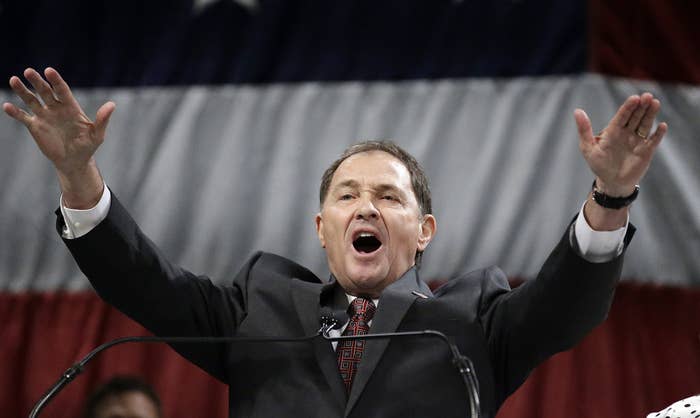
Simmering tensions over federal land in the West may have cost Utah's incumbent governor his job on Saturday, while also boosting the campaign of a harder-line challenger who has promised to sue the feds.
Federal lands — which cover vast swaths of most Western states, including Utah — were a key issue in the race between Gov. Gary Herbert and challenger Jonathan Johnson, who is the chairman of the board at Overstock.com. That race reached a climax when Johnson defeated Herbert at Utah's GOP convention.
Johnson took 55% of the vote to Herbert's 44%. Because neither candidate secured 60% of the vote, they will now face off in a primary in June, where Johnson will have significant momentum. Herbert could, however, benefit from a broader and theoretically more moderate electorate.
Because Utah is reliably red, the primary victor also will likely go on to win in November. And whatever happens in those next contests, the campaign has already set the stage for Utah to become an even hotter battleground in the fight over federal lands.

During the campaign, Herbert has touted his credentials as a champion of state control of public land. His record includes backing the Utah Public Lands Initiative, which Republican lawmakers drafted as a way to resolve land conflicts but has been slammed by conservationists. He opposes a potential national monument at Bears Ears, an archeologically significant Native American site. And he signed a bill demanding the federal government turn over its Utah lands to the state.
Herbert's leadership has also coincided with the growing prominence of a larger movement — sometimes known as the Sagebrush Rebellion — that seeks to whittle away at federal control of land across the West. That movement famously includes the Bundy family and their acolytes, who led armed standoffs in Nevada and Oregon, but also includes an array of legislative and legal strategies like the ones Herbert has supported.
Nevertheless, Johnson has attacked Herbert as too soft on the issue of federal land in the West. Earlier this month, he promised to sue the feds in order to take back the land — a strategy Herbert described as "risky." He has also stressed the economic potential of public lands, and in March told supporters "the federal government likes to expand its power. The states don't say 'no' enough."
The tussling over who would be toughest on the federal lands issue continued at Saturday's convention, where Herbert passed out novelty sheriff's badges with the words "fighting the feds" emblazoned across the front.
Herbert for Sheriff campaign passing out these badges. Nice compliment to the cowboy hats. #utpol
Herbert also distributed cowboy hats at Saturday's convention.
Heather Gardner speaking for S-23 spot. Chokes up talking about ancestors working to leave poverty. #utpol #utgop
Johnson, too, touted his stance on federal land Saturday, saying "if you want us to fight to get the [federal] lands transferred to the state, I'm your person," The Salt Lake Tribune reported.
Ending common core and resisting new taxes have also been prominent campaign issues for Johnson, but public lands have prompted some of his most heated exchanges with Herbert. And Herbert's Western-themed swag suggests that "fighting the feds" is key in the race.
Representatives for both campaigns did not immediately respond to BuzzFeed News' request for comment Saturday.
Whether Johnson or Herbert ultimately wins, the prominence of land issues in the race could have implications across the West. Thanks in part to Herbert's support of pro-state initiatives, Utah has become a kind of proving ground and intellectual base in the movement to transfer land to the states. As a result, whatever happens in Utah's gubernatorial election could reverberate across other Western states that are mounting their own challenges to federal authority.
